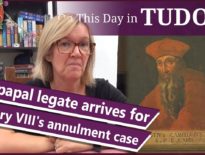On this day in Tudor history, 30th September 1544, fifty-three-year-old King Henry VIII returned to England after his third invasion of France and the French surrender of Boulogne to him and his troops.
Hear a contemporary account of what happened during the siege of Boulogne and how and why the French surrendered to Henry VIII, in today's talk.
Also on this day in Tudor history, Saturday 30th September 1553, Queen Mary I processed through the streets of London, from the Tower of London to Westminster on her coronation procession.
The procession was a mile and a half long and must have been such a spectacle for the citizens of London. There were also pageants, wine flowing in the conduits, streets hung with tapestries, and a new queen to see. Find out more about it in last year’s video:
Also on this day in history:
- 1515 – Margaret Tudor, sister of Henry VIII and former Queen Consort of James IV, fled to England. Margaret was pregnant with the child of her new husband, Archibald Douglas, 6th Earl of Angus. John Stewart, 2nd Earl of Albany, was acting as Regent for Margaret's son, the young James V, and had custody of the boy and his brother, Alexander.
- 1546 – Death of Sir Richard Long, member of Parliament and gentleman of Henry VIII's privy chamber.
- 1585 - Philip Howard, Earl of Arundel and son of Thomas Howard, 4th Duke of Norfolk, was received into the Catholic Church by Jesuit William Weston at Arundel Castle.
Transcript:
On this day in Tudor history, 30th September 1544, fifty-three-year-old King Henry VIII returned to England after his third invasion of France and his victory in Boulogne. The French forces had surrendered on 13th September after a siege which had lasted from 19th July.
This French campaign had been provoked by France helping Scotland against England, and the English king had allied with Emperor Charles V against France.
My favourite Tudor chronicler, Edward Hall, records the French campaign and Henry VIII’s victory, so I’m going to share his words with you today:
“The fourteen day of July the king’s majesty in his royal person passed the seas from Fover to Calais, and the six and twenty day encamped himself before Boulogne, on the north side within less than half a mile of the town, where his grace remained til the town was surrendered to his majesty. The which town he so sore assaulted and so besieged with such abundance of great ordinance that never was there a more valianter assault made, for beside the undermining of the castle, tower and walls, the town was so beaten with ordinance that there was not left one house whole therein. And so sore was laid to the charge of the Frenchmen that after the king has assaulted them by the space of a month, they sent forth of the town to the king two of their chief captains, called Monsieur Semblemound and Monsieur de Haies, which declared that the chief captain of the town with his retinue was contented to deliver the town unto his grace, so that they might pass with bag and baggage, which request the king’s majesty, mercifully granted them. And so on the next day, the Duke of Suffolk rode into Boulogne, to who in the king’s name, they delivered the keys of the town.
And at after noon departed out of Boulogne all the Frenchmen.”
He goes on to say that in all, four thousand, four hundred and fifty four people came out of the town “beside a great number of aged, sick and hurt persones, that was not able to go forth of the toune”, and that the last person to leave was the grand captain of Boulogne, “which when he approached near the place, where the king stood, he alighted from his horse, and came to the king. And after he had talked with him a space, the king took him by the hand, and he reverently kneeling upon his knees, kissed his hand, and afterward mounted upon his horse and so departed.”
Hall continue his account:
“The 18th day, the king’s highness having the sword born naked before him, by the Lord Marquess of Dorset, like a noble and valiant conqueror, rode into Boulogne, and the Trumpeters standing on the walls of the town, sounded their Trumpets, at the time of his entering, to the great comfort of all the king’s true subjects, the same beholding. And in the entering there met him the duke of Suffolk, and delivered unto him the keys of the town, and so he rode toward his lodging, which was prepared for him, on the South side of the town. And within two days after, the king rode about all the town, within the walls, and then commanded that our Lady Church of Boulogne, should be defaced and plucked down, where he appointed a Moat to be made, for the great force and strength of the town.
When the king had set all things there in such order, as to his wisdom was thought best, he returned into England, to the great rejoicing of all his loving subjects.”
It hadn’t quite been Agincourt, but Henry VIII was triumphant.
Boulogne was returned to France in Edward VI’s reign, in 1550, under the Treaty of Boulogne, and in 1558, in Mary I’s reign, England lost its remaining stronghold in mainland Europe when the French took Calais.



Leave a Reply